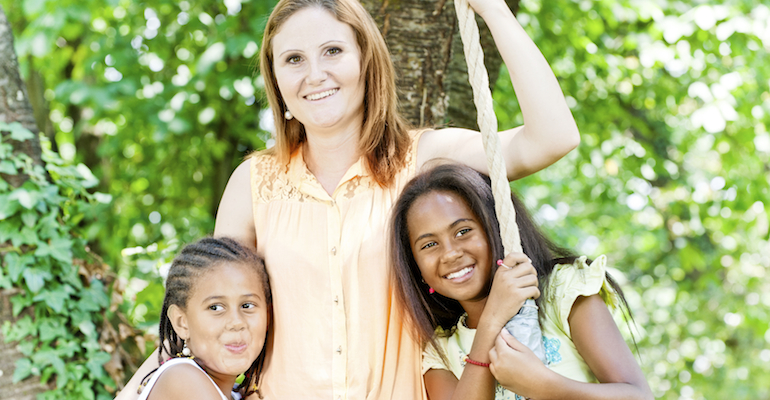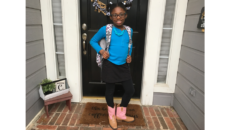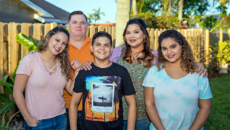“So, you wanted to adopt a white child?” The question stung me like a slap. It hurt all the more because it came from a fellow adoptive parent. Granted, this was not someone I knew well, but a professional acquaintance. We had met in his office before a working lunch, and he had shown me a photo of the beautiful daughter whom he and his wife had adopted internationally. I chimed in excitedly that I, too, was an adoptive parent. I flashed my own snapshot and said that my husband and I had adopted our daughter domestically. That’s when my colleague’s question struck me dumb, dashing any hope of a touchstone in common. When I finally found my voice, I said that, in fact, we had chosen the domestic route because we had wanted to adopt an infant. Then, with as much grace as I could muster, I moved to another subject.
It was days, however, before I fully regained my composure. Having struggled mightily to claim the proud mantle of parenthood, I hardly felt deserving of such an accusation. Had I not been rebuked as a racist? It was hard to interpret the comment any other way. Even my most tactless friends outside the adoption community had never said anything so crass.
Perhaps we expect insensitive questions and ill-informed remarks from the larger world. But from fellow adoptive parents we expect support, understanding, and the chance to be ourselves without explanation. For the most part, this is what we find. Yet occasionally, a slight — intentional or otherwise — comes from someone within the adoption community. When that happens, our pain and sense of betrayal run much deeper.
To be sure, most adoptive families do not go around tossing insults at one another. It takes a certain kind of imagination to adopt a child, a willingness to do something slightly out of the ordinary. That broadmindedness tends to set the tone for the support groups, conferences, or social gatherings that bring adoptive families together.
“My experience is that adoptive parents feel the connection and are very supportive of one another’s decisions, and very respectful,” says Ellen Singer, an adoption specialist at the Maryland-based Center for Adoption Support and Education.
Real Differences
Still, unfair judgments from within our community are not as rare as some might think. For all that we have in common, adoptive families do differ in significant ways. There may be a single parent, two parents, or parents of the same sex. Family members may be of different races, or of the same race. A child might have been adopted at birth, or at an older age. The adoption may be international or domestic. If international, a child might come from anywhere in the world. If domestic, the adoption might go through an agency or through the foster system, be open or confidential. The list goes on.
Little wonder, then, that families tend to congregate with others who share their same experience. Support groups have sprouted up to serve every conceivable family type. There are groups for families with children from Eastern Europe, China, Latin America, Korea, and Vietnam. Such groups can furnish a crucial link to a child’s country of origin.
Are We Inclusive Enough?
But there are dangers when families segregate themselves into narrowly defined groups, whether centered around a particular country, agency, or lifestyle. Those who don’t quite fit the mold may feel subtly excluded. A family with an Asian-born child may also include a child from Latin America, for example, or a domestically adopted or biological child. Such blended families may not feel fully welcome in a narrowly focused group.
“I think there’s a great deal of compartmentalization in the adoption community,” says Jane Brown, a Scottsdale, Arizona-based adoption social worker and educator. “There are lots of misconceptions, misunderstandings between one group and another.”
The leaders of country-specific support groups insist that they are inclusive, and that all kinds of families can and do participate. At the same time, such groups can inadvertently underscore differences between adoptive families. And families who spend all their time with others who made the same choices as they did have little opportunity to learn about different types of adoption. This can set the stage for some unfortunate assumptions.
Adoptive parent Elizabeth Franks, who heads an adoption support group in Russellville, Arkansas, was startled a while back to hear the insensitive comment that a parent with an Asian-born child made to a couple who had adopted from Russia. As Franks recalls, the gist of the remark was that “obviously, Russian children were going to have more problems.”
To Franks, the blunder was not intentionally offensive, but reflected the pride and excitement that the couple with the Asian child felt about their wonderful baby. However, she adds: “Out of that happiness came this really hurtful comment to the family with the Russian child.” Franks concedes: “That was not a supportive moment in the support group.”
Such insensitivity is the exception, not the rule, says Franks. Her group is open to all individuals touched by adoption, in part because of its location; she believes hers may be the only active adoption support group in Arkansas. Her group also reflects her own experience as an adoptive parent. Her children include an American-born Asian child and two mixed-race children of African-American heritage. “I couldn’t go to a restrictive group, because I would have to leave out some of my own kids,” she says. “That wouldn’t work for me at all.”
When Laurae Lyster-Mensh sat down for her first meeting with a local adoption support group in Virginia, she was filled with relief and excitement. But her joy at finding fellow adoptive parents turned to dismay when she saw that the first item on the agenda was whether to include parents, like herself, who had adopted domestically. It dawned on her that she was the only domestic adopter in the room, and she quietly slipped out the door.
“I felt like someone had kicked me in the stomach,” recalls Lyster-Mensh. “It was a physical, visceral reaction. I was crushed. I didn’t and don’t blame them, because I understand their need to have a safe place where you don’t have to go over the same dumb questions again and again.” Lyster-Mensh adds that the group did vote to include domestic adopters. But she is not a member.
Race Matters
Issues of race and ethnicity can be flash points when adoptive families get together. Lisa Tomlinson, a past coordinator of the National Capital Area chapter of Families for Children from Vietnam, reports that some parents have admitted to her that they believe those adopting from Eastern Europe “may be bigoted.” This misconception was dispelled as families got to know one another, Tomlinson explains. However, she adds, “The assumption is always that you made your own choice for pure reasons, and that everybody else’s motives are different.”
Such assumptions are damaging. “The decision to adopt transracially is very personal, and people have to be willing to embrace certain things in order to do that,” says Ellen Singer, adoption specialist at C.A.S.E. “I don’t think that people who choose not to adopt across racial lines should be made to feel racist.” Using her own story as an example, Singer points out that when she was trying to adopt, her agency put her on two waiting lists — one for Korea and one for a domestic adoption.
“Korea at the time was a two-year wait,” Singer recounts. “Two years seemed to me like an eternity. My daughter’s domestic adoption came through in ten months. And that’s how I wound up with a Caucasian child at two weeks, rather than a Korean child, who probably would have been ten months old. For somebody to accuse me of racism because I have a Caucasian child would be so off the mark.”
Common Interests
No one expects families to stop attending support groups with a specialized focus, of course. Such groups fill a vital niche. Without question, some adoption-related issues are unique to a particular group, region, or set of circumstances.
“There are specialized health issues for children who have been in orphanages,” says Karen Klein Berman, national chair of Families for Russian and Ukrainian Adoption (FRUA), a national nonprofit with nearly three-dozen chapters. By contrast, she notes, “Some countries, like Korea, don’t even have orphanages, so their issues are completely different.”
Country-centered groups also give parents who adopt internationally a way to honor their child’s cultural and ethnic heritage. “It’s important to let my sons know that there are others who have common interests and a common background,” says Pamela Heishman, who chairs FRUA’s Washington, D.C., chapter. The group is not “like a clique” at all, she stresses. “For our members, going to the St. Petersburg festival in Baltimore has a special significance.”
Joining the Larger Community
“People who have arthritis don’t go to cancer support groups,” concurs Penny Rearick, executive director of the Adoption Resource Center of Connecticut. Still, Rearick encourages families to mingle with the larger adoption community. “I think people need access to both types of groups,” she says. While many groups are narrowly designed, others are geared toward all types of adoptive families. These include C.A.S.E., and Adoptive Families Today, which serves more than 200 families in the Chicago area.
Kids, in particular, benefit from seeing the variety of experiences that other adoptive children have had, say adoption educators. “They learn a great deal by hearing the stories of others who’ve had different types of adoption experience,” notes Jane Brown, who runs “Adoption Playshops” for adopted children of all backgrounds.
Adoptive families also need to stick together for lobbying and political purposes, activists and experts maintain. Adoption remains greatly misunderstood and misrepresented in the national media. And there’s an ongoing need for public programs to support adoptive families. Says Rearick, “If we’re too segregationist about the way we’ve built our families, I think everyone loses.”
As for my colleague who so wounded me the day we had lunch, I bear him no ill will. At least he gave voice to his false impressions, giving me the chance to correct his misconception. Perhaps such candid exchanges should take place more often. Then maybe more of us would be reminded of our common ground — that we all are parents who wanted a child, and that ours are children who needed a family.



